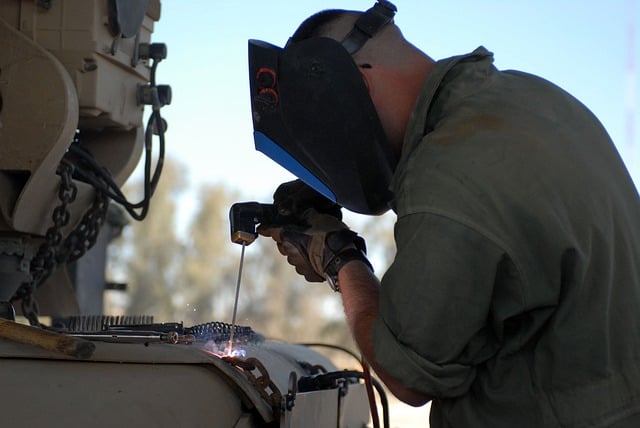
If you want to advance your skills and education but are unsure if a traditional four-year college is for you, you may want to consider a trade school. Attending a vocational school can be an excellent option for those who want to get the necessary training to secure a good job quickly.
In this article, I'll explain the benefits and potential disadvantages of trade schools. Also, I'll thoroughly describe the differences between trade schools, community colleges, and four-year colleges.
What Is a Trade School?
A trade school, sometimes referred to as a vocational school, technical school, or vocational college, is a post-secondary institution that's designed to give students the technical skills to prepare them for a specific occupation. Examples of trade schools include UEI, American Career College, and Chamberlain University. Trade schools can be public or private, but many are for-profit businesses.
At a trade school, you can get a degree in fields like information technology, nursing and health sciences, automotive technician training, and medical assisting. Program lengths vary, but typically, they can range from anywhere from eight months to two years.
Unlike a four-year college, you don't graduate from a trade school with a bachelor's degree. Usually, upon completion of the program, you'll receive a diploma or trade certificate acknowledging you successfully finished. For some programs you can earn an associate degree, which is the degree you get from a two-year college.
What Can You Do With a Degree From a Trade School?
After completing a trade school program, you can get a job directly related to the field you studied in your vocational school program. For example, once you complete a dental assisting program, you can get a job as a dental assistant. If you complete a program in plumbing, you can get a position as a plumber. Again, these schools are designed to prepare you for a job in a specific field.
Here are some of the jobs you can do with a degree from a trade school:
- Electrician
- Dental hygienist
- Plumber
- Paralegal
- Nurse
- Graphic Designer
- Welder
- Computer technician
- Aircraft mechanic
- Cosmetologist
- Chef
- Marine mechanic
- Construction manager
- Massage therapist
- Pharmacy technician

The Differences Between Vocational Schools, Community Colleges, and Universities
When you're deciding your path, it's important that you know the major differences between trade schools, community colleges, and four-year colleges. I'll outline the biggest differences between each type of school for you here.
Trade Schools
Trade school programs are the shortest; they run from less than a year to up to two years. As opposed to community colleges and four-year colleges, many vocational schools are for-profit businesses. The focus of trade schools is on giving students hands-on experience directly related to a specific job. At the end of a program, you can get a diploma or certificate, prepare for a licensing exam, or become an apprentice or journeyman in a skilled trade. Admission is mostly open enrollment.
There's really no extracurricular involvement or on-campus culture at trade schools. Students just attend their classes and get their professional training.
Community Colleges
Community colleges award associate degrees at the end of two years. Most community colleges are public, but there are private ones, which are usually referred to as junior colleges. Like trade schools, some community colleges give diplomas or certificates to students who complete a program to practice in a specific field like cosmetology or nursing. Admission is mostly open enrollment: high school graduates or students 18 or older can attend.
Community colleges tend to be the cheapest of all the college options. In 2022, the average tuition and fees for a year at a public two-year college for in-district students was $3,860, and the average at a public four-year college for in-state students was $10,940. The average cost to complete a trade school degree (1-2 years) is $34,740.
Socially, there are more options for students at community colleges than there are for students at trade schools. However, there are fewer options compared to students at four-year colleges. Community colleges often have sports teams, clubs, and on-campus residents, but many community college students commute and are only at school for their classes.
Also, you have the option of transferring from a two-year community college to a four-year college. Many students start at a community college and then transfer to get a four-year college degree. If you take this option, make sure the courses you take are transferable and that you're doing the necessary work to make yourself eligible to transfer.

Bronx Community College
Four-Year Colleges
Four-year colleges can be public or private, and the vast majority are non-profit.
After successfully finishing a program at a four-year college, you get a bachelor's degree. This is the most versatile and highest degree you can get compared to degrees at trade schools and community colleges. On average, those with bachelor's degrees make more money than those with associate degrees or trade school diplomas. Furthermore, bachelor's degrees are required to go on to graduate school or professional schools like law school, medical school, or dental school.
Even though four-year colleges do have pre-professional majors and programs, the focus is more on acquiring academic knowledge.
Socially, four-year colleges offer the most opportunities for students. There are varsity sports, intramural sports, campus clubs, fraternities, sororities, guest speakers, campus traditions, and a greater percentage of students who live on or near campus.
Benefits of Attending a Trade School Over a Four-Year College
Going to a vocational school does offer some undeniable benefits.
The most obvious benefit of going to a trade school is that trade schools require less time to complete. Almost all trade school programs can be finished in less than two years. Meanwhile, getting a degree from a community college normally takes two years, and getting a traditional four-year college degree usually takes at least four years to complete, and many students need a fifth or sixth year to get their degrees.
Less time in school allows you to get more job experience and progress faster in your career. Furthermore, if you're not in school, you won't have to pay for those additional years of college tuition and may have to take out fewer student loans.
Another advantage of trade schools is the hands-on preparation you'll receive for a specific job. Many four-year colleges and programs at four-year colleges focus more on scholarly learning than on job preparation. For example, if you graduate with a degree in philosophy or theater, you may have difficulty finding a job that's directly related to your major. At a trade school, the focus is on learning the skills that you'll be using in your job when you graduate.
Similarly, because the goal at a vocational school is to acquire the skills for a certain job, it may be easier to initially find a job in that field. Also, many trade school programs are geared toward fields in which there is high demand for workers.
Additionally, there are lucrative jobs you can get with a trade school degree. According to the Bureau of Labor Statistics, the median pay for dental hygienists was $78,810 in 2021. Meanwhile, the median starting salary for four-year college graduates was $60,028 for students from the class of 2022.
Finally, if you go to a trade school, you don't have to stress about the traditional college application process. Because the application requirements are much less strict at a trade school, if you decide to go to one, you won't have to spend the time or money associated with four-year college applications. You won't have to take the SAT/ACT. You won't have to stress about your grades. You won't have to worry about joining clubs just to enhance your college applications.

A trade school may be a good idea for you.
Disadvantages of Attending a Trade School
While vocational schools do offer some benefits, there are significant drawbacks, especially when compared to traditional 4-year colleges.
Even though there are financial benefits to going to a trade school, college graduates, on average, make more money than trade school grads. According to College Scorecard, the salary after attending, which is the median income for students receiving federal financial aid 10 years after graduating, for American Career College in Los Angeles ranges from $36,834 (varies depending on field of study). Comparatively, the salary after attending for UCLA in $73,744. Even after accounting for the additional time spent in school, the average UCLA graduate is going to come out well ahead financially.
Also, four-year colleges tend to offer more generous financial aid. After financial aid, the average cost for West Coast University in Anaheim, California is $37,550. Meanwhile, the average cost for an in-state student at CSU Long Beach, a California State University school, is $10,054.
Furthermore, if you go to a vocational school, you'll miss out on the traditional college experience. At trade schools, there's no real on-campus culture, and there's limited social interaction. At a four-year college, you can join clubs, attend campus parties, go to sporting events, join Greek life, and live in dorms with your peers. For many people, the college experience gives them wonderful memories and helps them form long-lasting friendships.
Much of the learning you do at a traditional college takes place outside of the classroom. You can attend lectures by famous politicians and prominent academics, and you're able to socially interact with students from all over the world.
At a trade school, the focus is on the job preparation you receive inside the classroom, and that's basically the extent of your education.
Additionally, traditional colleges offer a more broad, well-rounded education. Again, at a trade school, the education you receive is almost exclusively focused on preparing you for a specific job. At a traditional college, you'll have general education requirements that will expose you to a variety of different subjects, and even in many majors, you'll learn about a wide variety of topics.
In college, I was an American Studies major, which is an interdisciplinary major that focuses on the United States. I was able to take classes in sociology, education, religion, history, psychology, and political science that counted towards my degree. Outside of my major, I was able to take classes in numerous subjects like human biology, anthropology, statistics, and Spanish.
Traditional colleges pride themselves on not just preparing you for a specific job, but also teaching you critical thinking skills and making you an informed citizen who will be able to have a positive impact on society outside of your profession.
Finally, there's more job flexibility with a traditional college degree. Trade schools prepare you for very specific jobs, but there are a wide variety of jobs you can get with a bachelor's degree, regardless of your major.
If you study medical assisting at a trade school, your program will only prepare you to be a medical assistant. If you end up deciding that you want to do something else or can't find a job as a medical assistant, your vocational school degree won't be of much value.
On the other hand, a degree from a four-year college offers you many more job opportunities. There are sales, education, and consulting jobs that are open to four-year college graduates from a wide variety of majors. Furthermore, you can pursue graduate school and professional schools like medical school and law school with a four-year college degree. On average, with more education and advanced degrees, you'll make more money and have more job security.

Know about your options to make a wise decision.
Should You Go to a Trade School or a Four-Year College?
There are a few factors to consider when deciding whether to go to a trade school or a four-year college. Generally, I encourage all students who are capable to go to a four-year college.
You'll give yourself the most opportunities by graduating from a four-year school, and you'll likely have a more fun, enriching experience at a traditional four-year college. Also, by going to a four-year school, you'll have more earning potential and job flexibility.
A trade school is a good option if you can't spend the time to get a four-year degree or you're very sure that you want to do a job that you can prepare for at a vocational school. Sometimes, family or financial situations make it too challenging for students to spend four years in school, so they opt to complete a much shorter program at a trade school.
Also, some students just don't like traditional schooling. They struggle to do well in school because they detest reading and writing papers. They prefer doing something more active and don't want to spend at least four years in college to end up with a desk job.
If you know you want to be an automotive technician, you may benefit more from completing a trade school program than going to a four-year college. You'll get hands-on experience and be able to start your career in a short period of time.
Keep in mind that if you don't have the grades or test scores to go to a four-year college, you have options other than a vocational school. If you want to go to a four-year college, but you're worried that you don't have the qualifications to get admitted, check out the colleges with the highest acceptance rates. You still may be able to get in with sub-par grades and test scores.
Also, you can go to a community college and then transfer to a four-year college. Most community colleges are open enrollment, so you don't have to worry about being admitted.

If you want to fix cars, maybe you should go to a trade school.
How to Find the Right Vocational School for You
Once you've decided to attend a trade school, your next step is deciding which school is best for you. There are three main steps to doing this:
#1: Make Sure the Trade School Offers the Program You Want
Nothing else about the school matters if it doesn't have the program you want, so this is your first step. If you're interested in a specific program/certificate, make sure the school offers exactly what you're looking for so there are no surprises once you graduate. You can also ask admissions counselors at the school which jobs the program will qualify you for.
#2: Make Sure the Trade School Has a Good Reputation
It's imperative the school you attend has a good reputation so people who hire you will have confidence in the program you completed. Your school might have specific accreditation which you should research, and you should also read online reviews and speak to current and former students to see if they would recommend the school and program. Unfortunately, there are many vocational schools that exist mostly as diploma mills and will take a lot of your money without giving you a good education in return. Doing your research early on will help you avoid this.
#3: Make Sure You Can Manage the Costs and Schedule
Finally, you also need to make sure you can afford tuition costs (or be able to take out the necessary financial aid), and that the times the classes are offered work with your schedule. The school should also be able to estimate how many hours a week you should be devoting to the program, and you should make sure you're able to manage that workload or look into part-time options. One resource is the Pureland Supply Vocational and Skilled Trade Scholarship. It awards at least one $500 scholarship each year to a student attending a trade or vocational school. The deadline is typically in early May.
How to Apply to a Trade School
For the majority of trade schools, the application process is relatively simple. Most schools have a basic online application on their websites, or you can contact the school for admissions information. Also, there tend to be no application deadlines. You can apply at any time, but you may need to wait for the beginning of your program of interest before you can enroll.
Additionally, after you fill out the application, you may have to interview or speak with an admissions representative. These conversations are meant to be informational and help guide you to the program that would be best for you.
Trade schools aren't considered selective, and most are open enrollment. For the majority of schools and programs, you don't have to take the SAT/ACT, and you don't need to write an essay. Furthermore, trade schools won't require recommendations or consider your extracurricular activities when determining admission.
What's Next?
College can get expensive, so you want to be on the ball about financial aid. This comprehensive guide goes over everything you need to know about applying for financial aid, step by step.
If you're considering going to a four-year college, learn more about the college application timeline and if it matters where you go to college.
Interested in getting an associate's degree? Find out how to apply for community college and if you need to take the SAT or ACT to get in.
Have friends who also need help with test prep? Share this article!

Justin has extensive experience teaching SAT prep and guiding high school students through the college admissions and selection process. He is firmly committed to improving equity in education and helping students to reach their educational goals. Justin received an athletic scholarship for gymnastics at Stanford University and graduated with a BA in American Studies.


































 Holly R.
Holly R.